

Environmental Impacts of the Meat Industry. At Max & Ruffy’s we take conscious steps to maintain our intent as an ethical dog treat company.
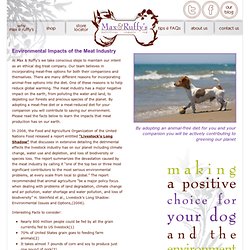
Our team believes in incorporating meat-free options for both their companions and themselves. There are many different reasons for incorporating animal-free options into the diet. One of these reasons is to help reduce global warming. The meat industry has a major negative impact on the earth, from polluting the water and land, to depleting our forests and precious species of the planet. By adopting a meat-free diet or a meat-reduced diet for your companion you will contribute to saving our environment. In 2006, the Food and Agriculture Organization of the United Nations Food released a report entitled “Livestock’s Long Shadow” that discusses in extensive detailing the detrimental effects the livestock industry has on our planet including climate change, water use and depletion, and loss of biodiversity or species loss. Interesting Facts to consider: Sam Woolfe: The Organic and Free Range Myth. The terms 'organic' and 'free-range' suggests that the meat, dairy or eggs you are buying are humane, ethical and cruelty-free.
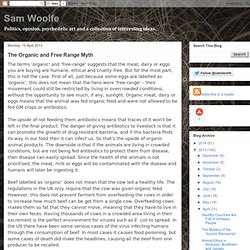
But for the most part, this is not the case. First of all, just because some eggs are labelled as 'organic', this does not mean that the hens were 'free-range' – their movement could still be restricted by living in overcrowded conditions, without the opportunity to see much, if any, sunlight. Organic meat, dairy or eggs means that the animal was fed organic feed and were not allowed to be fed GM crops or antibiotics. The upside of not feeding them antibiotics means that traces of it won't be left in the final product. The danger of giving antibiotics to livestock is that it can promote the growth of drug resistant bacteria, and if this bacteria finds its way in our food then it can infect us. Beef labelled as 'organic' does not mean that the cow led a healthy life. The Organic and Free-Range Myth. Organic Animal Products We’ve all seen the grocery store packages of meat, eggs, and dairy products decorated with reassuring phrases such as “natural” and “free-range” and pictures of happy animals running around quaint country barns.
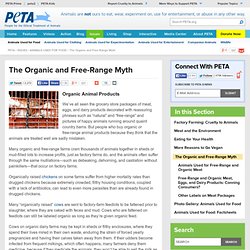
But people who buy organic or free-range animal products because they think that the animals are treated well are sadly mistaken. Many organic and free-range farms cram thousands of animals together in sheds or mud-filled lots to increase profits, just as factory farms do, and the animals often suffer through the same mutilations—such as debeaking, dehorning, and castration without painkillers—that occur on factory farms.
Organically raised chickens on some farms suffer from higher mortality rates than drugged chickens because extremely crowded, filthy housing conditions, coupled with a lack of antibiotics, can lead to even more parasites than are already found in drugged chickens. A Healthier Alternative? UPC Factsheet - Debeaking. "The emotion-laden word 'mutilation' is sometimes used in describing husbandry practices such as removing a portion of a hen's beak ...
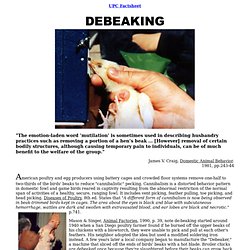
[However] removal of certain bodily structures, although causing temporary pain to individuals, can be of much benefit to the welfare of the group. " James V. Craig, Domestic Animal Behavior. 1981, pp.243-44 American poultry and egg producers using battery cages and crowded floor systems remove one-half to two-thirds of the birds' beaks to reduce "cannibalistic" pecking. Cannibalism is a distorted behavior pattern in domestic fowl and game birds reared in captivity resulting from the abnormal restriction of the normal span of activities of a healthy, secure, ranging fowl.
The Free-Range Myth. Some animal rights organizations have made tremendous strides in educating the public about what exactly occurs in battery hen operations.
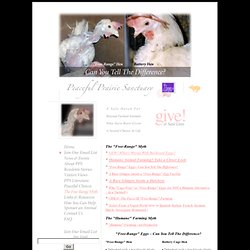
They have exposed the ugly truth, such as tens of thousands of hens crowded into long, poorly ventilated, completely dark sheds, fully automated feeding and egg collecting systems, filth, death and suffering. The recognition of how horrible the short lives of “battery hens” are has led many people to stop contributing to this atrocity by simply not buying those eggs.
Unfortunately, many other people have looked to so called "Cage-Free/Free-Range" eggs as an acceptable and humane alternative. Sadly the public is led to believe that "Cage-Free" hens live a happy, natural life. This is simply not so! I am often asked "Don't you think it is still better that people buy 'Cage-Free' eggs rather than battery produced eggs if they are going to buy eggs anyway? " It is like asking if I think strangulation is better than suffocation. Top 1. 2. Free-range. Factory Farming: Cruelty to Animals. On today’s factory farms, animals are crammed by the thousands into filthy, windowless sheds and confined to wire cages, gestation crates, barren dirt lots, and other cruel confinement systems.
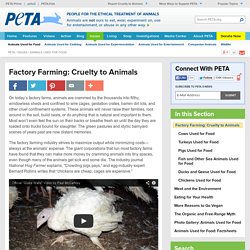
These animals will never raise their families, root around in the soil, build nests, or do anything that is natural and important to them. Most won’t even feel the sun on their backs or breathe fresh air until the day they are loaded onto trucks bound for slaughter. The green pastures and idyllic barnyard scenes of years past are now distant memories. The factory farming industry strives to maximize output while minimizing costs—always at the animals’ expense.